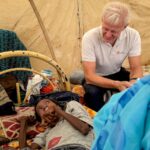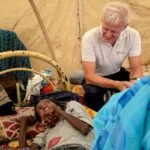
Sudan is on the brink of a catastrophic humanitarian disaster as ongoing conflict plunges the North African nation into unprecedented levels of hunger, displacement, and violence. Over 25 million people are enduring acute food insecurity, while millions have been forcibly displaced. The international community’s delayed and insufficient response risks consigning an entire generation to famine and poverty.
In April 2024, leaders from France, Germany, and the European Union convened aid organisations, including the United Nations, in Paris to pledge $2.1 billion in support for Sudan’s civilians. Months later, this funding has proved insufficient. Hunger levels have tripled, pushing more than half of Sudan’s population into acute need. In a joint statement issued in September, the Norwegian Refugee Council (NRC), Danish Refugee Council (DRC), and Mercy Corps expressed dismay at the growing famine and the continued silence from the global community.
Despite these warnings, the crisis has only worsened. The humanitarian response in the country remains critically underfunded. The Paris pledges covered less than half of the required funding, forcing agencies to make agonising decisions about who to help.
Following a recent visit to Sudan in November, NRC’s Secretary General Jan Egeland warned that the hunger crisis in Sudan had reached a catastrophic level, with half the population in acute need of food and 1.5 million on the verge of famine.
The NRC has supported over 1.14 million people across Sudan this year and is stretched thin. Partnerships with 43 national organisations have helped, but the scale of the crisis far outpaces available resources.
Despite the staggering scale of the crisis, the international community has failed to mount an adequate response. While isolated expressions of concern have been voiced, meaningful action has been absent. For Egeland, this inaction amounts to tacit approval of continued suffering.
“A tweet of concern is not enough,” he said. “The world’s inaction is nothing short of a green light for further suffering. Sudan needs a global emergency response on par with the scale of this crisis. The world must not look away as millions teeter on the edge of famine and conflict devastates entire communities.”
“This is the world’s worst crisis, but we are met with deafening silence. We must wake up the world before famine engulfs a generation of children,” Egeland added.
A war on civilians
What began as a conflict between the Sudanese Armed Forces (SAF) and the paramilitary Rapid Support Forces (RSF) has morphed into widespread violence, targeting civilians and destroying infrastructure. The US-based Armed Conflict Location and Event Data Project (ACLED) reported that in October 2024 alone, over 2,600 people were killed, and 274,000 were newly displaced due to attacks and fighting across the country.
Research by the London School of Hygiene and Tropical Medicine shows that between April 2023 and June 2024, over 61,000 people died in Khartoum alone, with violence claiming more than 26,000 lives nationwide. Alarmingly, 90 per cent of deaths remain unrecorded, pointing to an even graver toll in regions like Darfur and Kordofan, where targeted violence has devastated communities.
“Entire villages destroyed, civilians executed, women raped, and homes lost to shelling and airstrikes,” said Egeland. “This is the scorched earth of Sudan in 2024, and we are dangerously close to a freefall into starvation and suffering.”
The war has triggered the world’s largest displacement crisis, with over 11 million people uprooted within Sudan and an additional three million fleeing to neighbouring countries like Chad, Egypt, and South Sudan. Many displaced people are sheltering in overcrowded camps, where resources are scarce, and survival is a daily struggle.
An analysis by the United Nations Office for the Coordination of Humanitarian Affairs (OCHA) shows that hunger is the most immediate threat, with an estimated 24 million people in acute need of food. Of these, 1.5 million are teetering on the edge of famine. In urban centres like Khartoum, once the economic heartbeat of Sudan, starvation has become a grim reality. In rural areas, subsistence farmers and pastoralists have lost their livelihoods, leaving entire families reliant on aid that often cannot reach them due to blocked access.
“The ongoing starvation here is a man-made tragedy,” said Egeland. “In Darfur, I met women barely surviving, eating one meal of boiled leaves a day,” he recounted. “The warring sides, who are obstructing access to these communities, bear direct responsibility for this catastrophe. This humanitarian crisis could be stopped at any moment.”
Both the SAF and RSF have weaponised hunger, obstructing humanitarian aid from reaching desperate communities. Aid trucks are delayed, authorisations are withheld, and distribution is sabotaged. The NRC has condemned this as morally indefensible.
“Each delay, every blocked truck, every authorisation delayed is a death sentence for families who can’t wait another day for food, water, and shelter. It is morally indefensible,” said Egeland.
The way forward
To avert Sudan’s total collapse, immediate and sustained action is imperative. The NRC emphasised the need for warring parties to grant unhindered access to aid organisations, enabling the delivery of food, water, and medical supplies to vulnerable communities.
The global community must urgently address the severe funding shortfall for Sudan’s humanitarian appeal, as millions remain at risk of starvation and death without adequate resources.
Additionally, the NRC called for decisive international engagement with SAF and RSF to end hostilities and ensure accountability for war crimes and human rights abuses. Beyond emergency relief, the organisation stressed the importance of rebuilding Sudan’s infrastructure, stabilising its economy, and supporting displaced populations to foster long-term resilience and recovery.
“This is not just Sudan’s crisis; it is a global crisis,” Egeland warned. “If the world continues to look away, we will lose an entire generation to hunger, violence, and displacement. We must act now, decisively and collectively, to save Sudan’s people and future.”
Sudan is facing a severe humanitarian crisis due to ongoing conflict, resulting in immense hunger, displacement, and violence.
Approximately 25 million people are experiencing acute food insecurity, and millions have been displaced.
International aid pledges, such as the $2.1 billion from France, Germany, and the EU in April 2024, remain inadequate, exacerbating the crisis. With over 50% of the population in dire need, there are substantial funding shortages for relief efforts.
The conflict, originally between the Sudanese Armed Forces and the paramilitary Rapid Support Forces, has escalated to civilian-targeted violence, causing mass displacement.
Recent studies indicate a high death toll, particularly in areas such as Darfur, Khartoum, and other regions where access to aid is blocked.
Aid organizations face significant challenges as hunger is used as a weapon, further complicating humanitarian efforts. Immediate global intervention and funding increases are crucial to prevent famine and support Sudan’s recovery.
